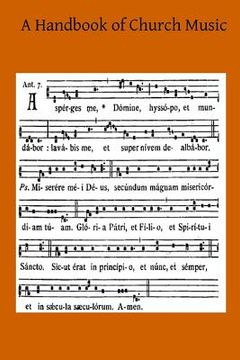A Handbook of Church Music: A Practical Guide for All Those Having the Charge of Schools and Choirs, And Others Who Desire to Restore Plainsong to (en Inglés)
Reseña del libro "A Handbook of Church Music: A Practical Guide for All Those Having the Charge of Schools and Choirs, And Others Who Desire to Restore Plainsong to (en Inglés)"
In the first place, it is not, as some suppose, a service which concerns priests alone. It is one in which all have a part: it is the heritage of all Catholics. We may say, indeed, that it has a lay origin, for the Divine Office owes its beginning in the Christian Church to the assembling of the people together, and especially the religious of both sexes. We must bear in mind that the early monks were laymen, and in the time of St. Benedict the priest-monk was the exception, not the rule. The Divine Office has nothing especially clerical in its structure, as it is said daily by nuns without the presence of a priest, also by various secular confraternities and societies in Catholic countries. We read in the Peregrinatio Etheriae how the faithful in Jerusalem in the fourth century assembled together for the morning and evening services, and it would appear that the congregation was almost entirely composed of lay people, the Bishop with his clergy entering towards the end, when the Bishop concluded with prayer. In Rome also on Sundays and Station days, all the faithful assembled for the vigils, and although owing to the crowds great disturbances sometimes took place, still, when Vigilantius urged this as a reason for the discontinuance of the service, the Roman Church, to show the great value which she set upon the service, condemned Vigilantius. The service was eminently congregational and remained so, the earliest servicebooks bear witness to the fact, inasmuch as books were written not one for each type of service, but one for each class of person engaged in the service, as is still done in the Eastern Church; for instance, for the Mass we find the SACRAMENTARY containing the Celebrant's part, the GOSPEL BOOK for the deacon, the ANTIPHONALE MISSARUM for the singers; and for the Divine Office, the COLLECTAR for the officiant, the LESSON BOOK for the reader, the RESPONSORIAL for the singers. As time went on and piety declined, the services were performed in a less dignified manner, the old Solemn Mass wellnigh disappeared, and High Mass gave way to Low Mass, and hence all parts of the Mass were gathered into one book. In the Divine Office, when it came to be said in private, the parts assigned to officiant, reader, and singer, were gathered into one book, hence our Breviaries. The Carthusians, the most conservative Order in the Church, have kept to the old way; no Breviaries are used in choir, but the ANTIPHONER, the PSALTER, etc., are employed. The sole Breviary that is used is a small one with shortened lessons, for those monks who are sick and thus unable to attend the choir. The ideal, however, of the public service was never lost sight of. High Mass and the Divine Office were daily sung in all cathedrals and monastic and collegiate churches; and, what is more, in England, right up to the Reformation, the Divine Office was performed daily in all large parish churches; and even in the smallest churches it was performed on Sundays and Feast-days. More than this, we have proof that the lay-people attended, and each Sunday, at least, they assisted at Matins and Vespers (or to give it its old English name, Evensong).It is scarcely necessary to give examples, there are so many, and no one who knows anything of the ecclesiastical history of this country would venture to deny it. To give only two instances, Langland says that all business is to stop on the Lord's Day, and that all ought to hear God's service, both Matins and Mass, and after meat to hear Evensong. Saint Thomas More bears witness to this; he himself attended Matins, and he reproves those that neglect to do so even on Sundays. In 1557, Cardinal Pole inquired whether taverns and ale-houses opened their doors on Sundays and holy days in times of Mass, Matins, and Evensong, showing that these were the services of general obligation.

